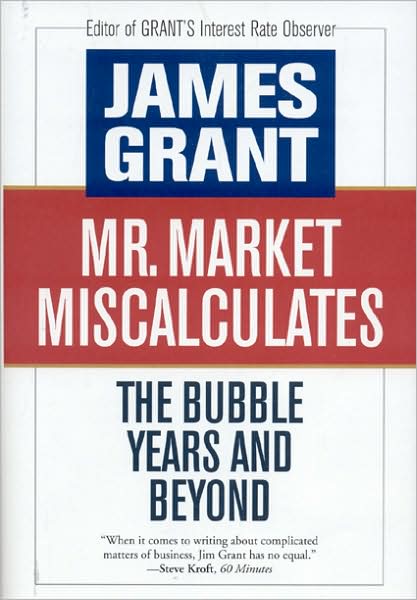
Since the first time I read him, I have been a fan of James Grant.? He helped to sharpen my focus on how money and credit work in the long run, and how they affect the economy as a whole.? Reading one of his early books, Minding Mr. Market: Ten Years on Wall Street With Grant’s Interest Rate Observer, I gained perspective on the increasingly complex financial world that we were moving into.
But not all have shared the opinion of Mr. Grant’s wisdom.? When I worked for Provident Mutual, the Chief Portfolio Manager (at that time new to me, but eventually a dear colleague) said to me, “feel free to borrow any of the publications we receive.”? For a guy who likes to read, and learn about investments, I was jazzed. But, when I came back and asked whether we subscribed to Grant’s Interest Rate Observer, I got the look that said, “You poor fool; what next, conspiracy theories?” while she said, “Uh, noooo. We don’t have any interest in that.”
Now the next two firms I worked for did subscribe, and I enjoyed reading it from 1998 to 2007. But now the question: why buy a book that repeats articles written over the last fifteen years?
I once reviewed the book Just What I Said: Bloomberg Economics Columnist Takes on Bonds, Banks, Budgets, and Bubbles, by another acquaintance of mine, the equally bright (compared to James Grant) Caroline Baum.? This book followed the same format, reprinting the best of old columns, with modest commentary.? In my review, I cited Grant’s earlier book as a comparison, Minding Mr. Market.
As an investor, why read books that will not give an immediate idea of where to invest now?? Isn’t that a waste of time? That depends.? Are we looking to become discoverers of investment/economic ideas, or recipients of those ideas?? Books like those of Grant and Baum will help you learn to think, which is more valuable than a hot tip.
Here are topics that the book will help one to understand:
- How does monetary policy affect the financial economy?
- Why throwing liquidity at every financial crisis eventually creates a bigger crisis.
- Why do value (and other) investors need to be extra careful when investing in leveraged firms?
- What is risk?? Variation of total return or likelihood of loss and its severity?
- Why financial systems eventually fail at compounding returns at rates of growth significantly above the growth rate of GDP.
- Why great technologies may make lousy investments.
- Why does neoclassical economics fail us when trying to understand the financial economy?
- How does one recognize a speculative mania?
- And more…
The largest criticism that can be leveled at James Grant was that he saw that he would happen in this crisis far sooner than most others.? Being too early means you eventually get disregarded.? The error that the “earlies” made, and I knew quite a few of them, was not recognizing how much debt could be crammed into the financial economy in order to juice returns on fixed income assets with yields lower than likely default losses.? That’s a mouthful, but the financial economy had not enough good loans to make relative to the amount of loans needed to maintain the earnings growth expectations of the shareholders of financial companies. Thus, the credit bubble, facilitated by the Fed and the banking regulators.? You can read all about it in its many facets in James Grant’s book.
You can buy the book here: Mr. Market Miscalculates: The Bubble Years and Beyond.
Who would benefit from the book?
- Those that have assumed that neoclassical economics adequately explains the way our economy works.
- Those that want to understand how monetary policy really works, or doesn’t.
- Those that want to learn about equity or fixed income value investing from a quirky but accurate viewpoint.
- Those that want to be entertained by intelligent commentary that proved right in the past.
As with other James Grant books, this does not so much deal with current problems, as much as educate us on how to view the problems that face us, through the prism of how past problems developed.
Full disclosure: If you buy anything through the links to Amazon at my blog, I get a small commission,? but your costs don’t go up.?? Also, thanks to Axios Press for the free review copy.? I read the whole thing, and enjoyed it all.
